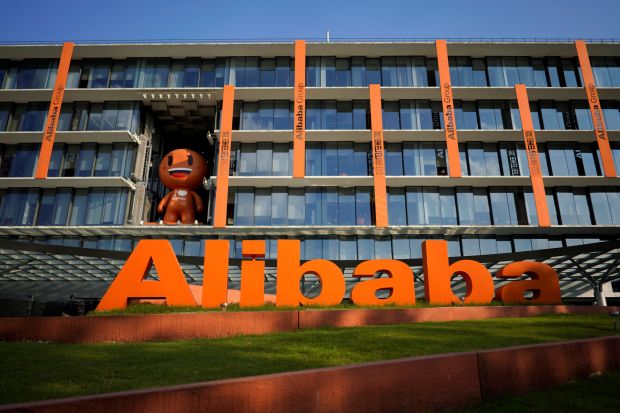Alibaba recently launched an initiative that it says will help companies of all sizes,across a wide array of industries,embrace digital transformation.
The program,dubbed A100,marks another step by Hangzhou-based Alibaba Group to expand its footprint beyond new retail,and represents the latest shift to enterprise-facing tech,which recently has been gaining momentum in China.
A100 will be powered by Alibaba Business Operating System,a term used by the company to refer to its amalgamation of technology services,including online marketplaces like Taobao and Tmall,payment tool Alipay,logistics Cainiao,cloud computing Alibaba Cloud,and productivity tool DingTalk.
“This is a continuation of a race to snap up leading retailers and lock them into Alibaba or Tencent’s service ecosystems,”says Michael Norris,strategy and research manager of AgencyChina,referring to the program and similar enterprise-focused initiatives by Chinese tech giants.
Deborah Weinswig,CEO and founder of Coresight Research,says she expects A100 to help Alibaba foster its relationship with brands and retailers even more closely.
“Since Alibaba already is dominating the online retail space,it is trying to leverage on this strength,to get an even tighter bonding with the brands and retailers,”says Weinswig.
A100 debuted late last week at the Alibaba One Business Conference,which took place in the hometown of the e-commerce giant.
At the event,Daniel Zhang,chief executive officer of Alibaba Group named 11 key elements for enterprises to realize transformation in the digital era,namely:branding,product development,sales,marketing,channel management,manufacturing,customer services,finance,logistics and supply chain,organizational structure,and communication management.

Daniel Zhang, CEO of Alibaba Group. (Image credit: Alibaba)
Toby Xu,vice president of Alibaba Group and head of the A100 program said that while many of customer-facing companies in China have already embraced digitalization,for corporate-facing companies the process is more difficult given the complexity of enterprise environments.
“The name,A100,symbolizes Alibaba’s goal of providing digitized solutions to a large number of companies,”says Xu.The plan is initially to take a focused,step-by-step approach targeting a defined number of industries,before later expanding the scope of A100’s application to a broader array of industries.
Xu says Alibaba has developed a strong set of technological capacities in running various services under its brand.“We want to share these capacities to with our partners,helping them to improve work efficiency and generate value,”he says.
Norris says that when we look at the 11 different areas where Alibaba is proposing to offer digital transformation services,it can be seen that the group is looking to help brands digitize their entire supply and value chain.
Enterprise gains momentum
The enterprise tech is picking up pace in China.Alibaba rival Tencent,which has its core services in consumer-faced gaming and social networking,upgraded its organizational structure to focus on enterprise services and cloud last year.Early stage startups are catching up too with their innovative ideas.
One of the major reasons that driving the shift is a changing mindset of small-and medium-sized businesses operators,according to Kuantai Yeh,partner at Qiming Venture Partners,said at a recent demo day of Shanghai-based startup accelerator Chinaccelerator.
They are more“willing”to pay for software as a service(SaaS)experiences primarily because these new SaaS companies were leveraging new technologies of AI and cloud computing to“add more value.”
The transition also comes as more Chinese tech companies expand overseas,especially to Southeast Asian markets.Alibaba Cloud now has 49 availability zones across 18 economic centers globally,while Tencent Cloud zones in on Asian markets with a second center in India.This means Chinese tech companies offering enterprise-focused services will increasingly come into direct competition with international brands such as Amazon Web Services(AWS),Microsoft(Azure),IBM,and Google.Intensified competition from Chinese companies could also impact productivity tools such as Slack and Salesforce.
At the Hangzhou event,special attention was paid to Alibaba’s brand-oriented e-commerce platform Tmall and productivity tool DingTalk.
By digging into big data,Tmall’s innovation center is helping over 600 brands to develop nearly 400 products,of which around half become top sellers three months after launch,according to Jet Jing,President of Tmall.
Meanwhile,DingTalk streamlines internal communication and organizational structures for companies.“If Alibaba’s ecosystem gets bigger,then that should bring benefits for DingTalk,especially in the sphere of retail,”says Weinswig of Coresight Research.“But that doesn’t mean DingTalk will be the winner in the battle between it and WeChat Work in the enterprise environment,because there are many types of enterprise businesses other than retail.”
Industries that are not directly related to new retail such as hotel,and food and beverage,will continue to use WeChat Work for their businesses,she says.“So it will be a very delineated market and Alibaba is poised to dominate in retail space,”Weinswig adds.

New retail and beyond
Dustin Jones,a managing director with Fung Retailing Group,a retailing enterprise that represents over 30 foreign brands in the Chinese market,says its partnership with Alibaba Group will help Fung Retailing to gain deeper marketing insights.Jones cites the geo-targeting of consumers and brands,and marrying them together,as an example.
“We do not only say‘We know these consumers will like these brands.’It’s deeper and more powerful than that,”says Jones.“We know these consumers will like this brand,and will like this product from this brand,and will like this color,this size in this location at this time.”
To be sure,the trend is not confined just to Alibaba.JD is pursuing a similar strategy under the banner of“unbounded retail,”while Meituan-Dianping also joined the battle to offer its own offline concept stores.
Alibaba’s A100 pits its new retail ecosystem against what Tencent and JD have been building through acquisitions and partnerships.Combined,Tencent and Alibaba spent$12 billion on retail-focused merger and acquisition activity between 2017 and 2018,according to Norris at AgencyChina.
The first batch of customers for A100’s rollout includes global brands like Starbucks,Nestléas well as Chinese snack brand,Bestore.








